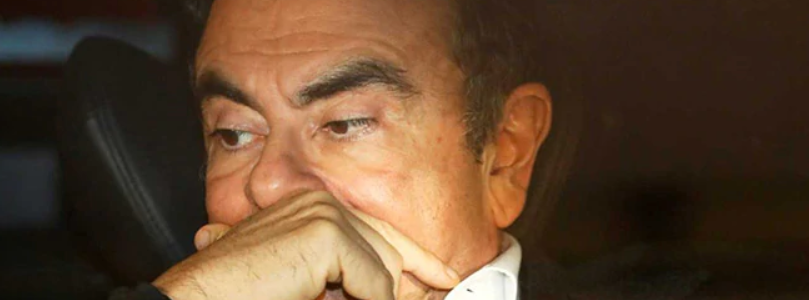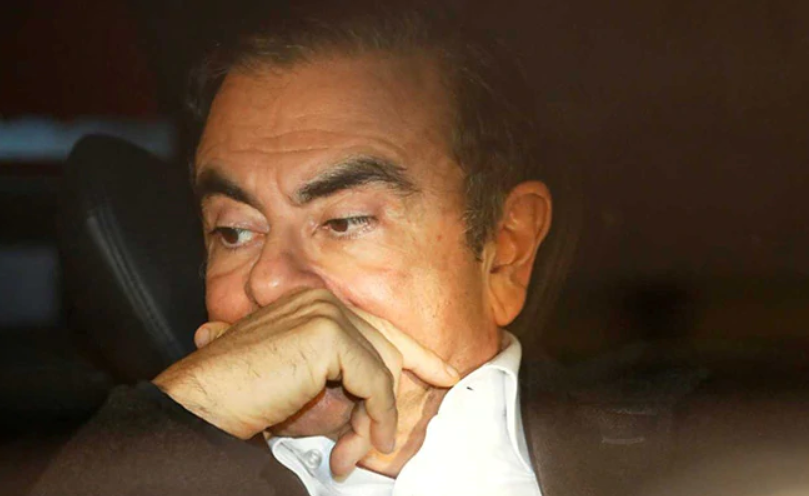
Ghosn flee from Japan

Carlos Ghosn, a Brazilian born French businessman of Lebanese ancestry, who served as the CEO of Michelin North America, Chairman, and CEO of Renault chairman of AvtoVAZ chairman and CEO of Nissan and chairman of Mistubishi Motors Fled from Japan by using one of the 2 French passports and Lebanese ID, entered Lebanon, confirmed by Ghadi Khoury the Lebanese foreign ministry’s director of political affairs, as Japan launched a probe into the embarrassing security lapse. There are widespread report suggesting that he was smuggled out inside a musical instrument case. His escape under strict bail conditions and daily surveillance may rank as one of the great vanishing acts of all time, even greater than Asil Nadir’s fleeing the UK on a light aircraft to France where he flew on to the Turkish Republic of Northern Cyprus, to escape trail of 66 charges relating to the collapse of Polly Peck, in the UK. Could the once-famous “Davos Man” make a surprise return to the World Economic Forum in Switzerland next month? Japan has extradition treaties with South Korea and the US.
In September, he paid $1m to settle fraud charges with the US Securities and Exchange Commission, over allegations the former Nissan boss his more than $140m of his pay package. Although Mr. Ghosn never admitted or denied any of the charges, the settlement bans him from senior positions in any US company for a decade. Nissan-Renault-Mitsubishi alliance also started probes into Mr. Ghosn’s activities, but these have concluded. French inquiries into the funding of a party at Versailles and payments from a Dutch company funded by the alliance and run by Mr. Ghosn are also pending. But Mr. Ghosn remains defiant.
The escape is unlikely to upset the entire proceedings surrounding the four charges Mr. Ghosn faces, all of which he denies. Two of those relating to understating his pay by more than $80m in Nissan’s financial statements. The trial for these two charges would also involve Nissan, which is accused of falsifying its former boss’s pay, and aide Greg Kelly charged with conspiring with Mr. Ghosn to understate his pay which Mr. Kelly denies but remains in Tokyo awaiting trail. Ghosn also faces a separate trial for breach of trust charges. If the Japanese court determines he breached his bail conditions, it would also confiscate ¥1.5bn ($14bn) in bail posted by Mr. Ghosn, whose arrest in November 2019 has shone a spotlight on Japan’s justice system and the pressure applied to extract confessions from suspects.
Lebanon’s establishment has glorified Mr. Ghosn, by even putting him on a postage stamp, after his arrest last year, a supporter paid for billboards across the city to read “We are all Carlos Ghosn”, but many ordinary Lebanese are more cynical about the multi-millionaire.
Ghosn, who faces multiple charges of financial misconduct that he denies, won bail in April 2019, but with strict conditions including a bar on overseas travel.
His lawyer Junichiro Hironaka has said lawyers hold three passports belonging to the international tycoon, who holds French, Brazilian and Lebanese nationalities.
Lebanon pressed for Carlos Ghosn’s return one week before the former Nissan chairman escaped from Tokyo to Beirut with the help of private security operatives, who has been planning his flight for the past couple of months.
Lebanon’s efforts became clear as it emerged that preparations had begun in October and involved a team of hired professionals, as Ghosn flew out of Osaka airport on a private jet, after evading round the clock surveillance by Tokyo prosecutors and overcoming the seizure of his passports.
Although Lebanese justice ministry has requested Mr. Ghosn’s return soon after his arrest last year which Tokyo did not respond, authorities had renewed Ghosn’s return request during a visit to Beirut by Keisuke Suzuki, Japan’s state minister for foreign affairs on December 2, 2019.
Mr. Ghosn’s flight to his mother’s native country means he will avoid standing trial in Tokyo on charges of financial misconduct related to his time as head of the Nissan Renault carmakers’ alliance.
The trail which was scheduled to begin in the autumn could have dragged for several years.
Mr. Ghosn said after he arrived in Lebanon, he was not fleeing justice but had “escaped justice and political persecution” in Japan.
